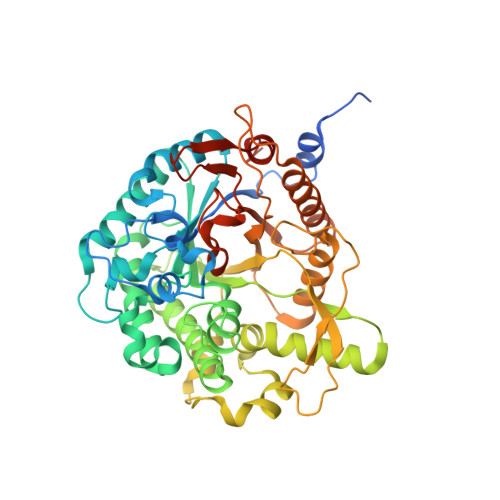Agrobacteria reprogram virulence gene expression by controlled release of host-conjugated signals.
Wang, C., Ye, F., Chang, C., Liu, X., Wang, J., Wang, J., Yan, X.F., Fu, Q., Zhou, J., Chen, S., Gao, Y.G., Zhang, L.H.(2019) Proc Natl Acad Sci U S A 116: 22331-22340
- PubMed: 31604827
- DOI: https://doi.org/10.1073/pnas.1903695116
- Primary Citation of Related Structures:
6RJK, 6RJM, 6RJO, 6RK2 - PubMed Abstract:
It is highly intriguing how bacterial pathogens can quickly shut down energy-costly infection machinery once successful infection is established. This study depicts that mutation of repressor SghR increases the expression of hydrolase SghA in Agrobacterium tumefaciens , which releases plant defense signal salicylic acid (SA) from its storage form SA β-glucoside (SAG). Addition of SA substantially reduces gene expression of bacterial virulence. Bacterial vir genes and sghA are differentially transcribed at early and later infection stages, respectively. Plant metabolite sucrose is a signal ligand that inactivates SghR and consequently induces sghA expression. Disruption of sghA leads to increased vir expression in planta and enhances tumor formation whereas mutation of sghR decreases vir expression and tumor formation. These results depict a remarkable mechanism by which A. tumefaciens taps on the reserved pool of plant signal SA to reprogram its virulence upon establishment of infection.
Organizational Affiliation:
Guangdong Province Key Laboratory of Microbial Signals and Disease Control, Integrative Microbiology Research Centre, South China Agricultural University, 510642 Guangzhou, China.















